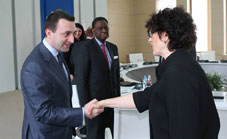
UN Population Fund Director visits Georgia
By Salome Modebadze
Wednesday, February 19
Executive Director of the United Nations Population Fund (UNFPA) and Under-Secretary General of the United Nations, Babatunde Osotimehin, paid a visit to Georgia on February 16-18 to participate in UNFPA’s Planning Meeting for the Eastern Europe and Central Asia region.
During his official visit, Osotimehin met with Prime Minister Irakli Garibashvili and President Giorgi Margvelashvili, as well as the top officials of the partner ministries to discuss cooperation and reiterate UNFPA’s support to the Government of Georgia for implementing the ICPD Programme of Action.
During the meeting with President Margvelashvili on February 17, the sides discussed the 15-year cooperation between the UNFPA and Georgia. The executive director of the UNFPA expressed his hopes that cooperation will continue with the new Georgian government.
Meeting with the Georgian PM, Osotimehin promised that UNFPA will assist Georgia to make more successful steps that will have a real impact on each and every citizen. Osotimehin hoped that the social investments defined by the budget would positively reflect on the life of the Georgian population.
Osotimehin believes that Georgia has played "a great role” in global conversation in the new development agenda. He said UNFPA is “encouraged to see Georgia has a dynamic government and the president was committed not only to speak but to act, because there are commitments in the budget.”
The visit of the executive director is a significant event for the UNFPA Georgia Country Office, as it celebrates its 15 year presence in Georgia in 2014. The UNFPA’s support to the country within the framework of the second Country Programme (2011-2015) aims to support the fulfillment of the country’s international commitments, such as promotion of reproductive health and rights of the population, strengthening gender equality, combating gender-based violence, empowering youth and strengthening national capacities for generating reliable population data for informed policy-making and planning.
UNFPA has cooperated with the Georgian Government for many years in the prevention of breast cancer and ovarian cancer by financing a method of early detection of the diseases.
The year 2014 marks the 20th anniversary of the adoption of the Programme of Action by the landmark Cairo International Conference on Population and Development (ICPD), which placed reproductive health and rights, gender equality and youth-related issues at the center of the development agenda. A comprehensive review is currently underway on how countries have implemented the Programme of Action, culminating in a special session of the UN General Assembly in September. The results of the ICPD Beyond 2014 review process will inform the post-2015 development agenda.
On February 16, 2014 Osotimehin visited the National Screening Centre in Tbilisi, a key partner of UNFPA’s cancer screening programme. UNFPA and the Government of Georgia have established a long-term partnership for co-funding the prevention and early detection of breast and cervical cancer. The screening programme, launched in 2008 with funding from the municipality of Tbilisi and UNFPA, has been expanded throughout Georgia with support from the Ministry of Labour, Health and Social Affairs and the National Centre for Disease Control and Public Health. Osotimehin met the National Screening Centre staff and members of the Winner Women’s Club – breast cancer survivors who will share their activities and experience in breast cancer advocacy.
On the same day, the executive director also met Georgian youths and media representatives at Tbilisi State University to discuss youth priorities and activities and how the media covers and impacts society’s awareness on youth issues, sexual and reproductive health and reproductive rights, gender equality, and domestic violence. The dialogue also gave an opportunity for media representatives to obtain first-hand information on youth issues and priorities and engage in meaningful dialogue with young activists to better reflect and integrate these issues in media.
According to UNFPA, the fund works to deliver a world where every pregnancy is wanted, every child-birth is safe and every young person’s potential is fulfilled.



